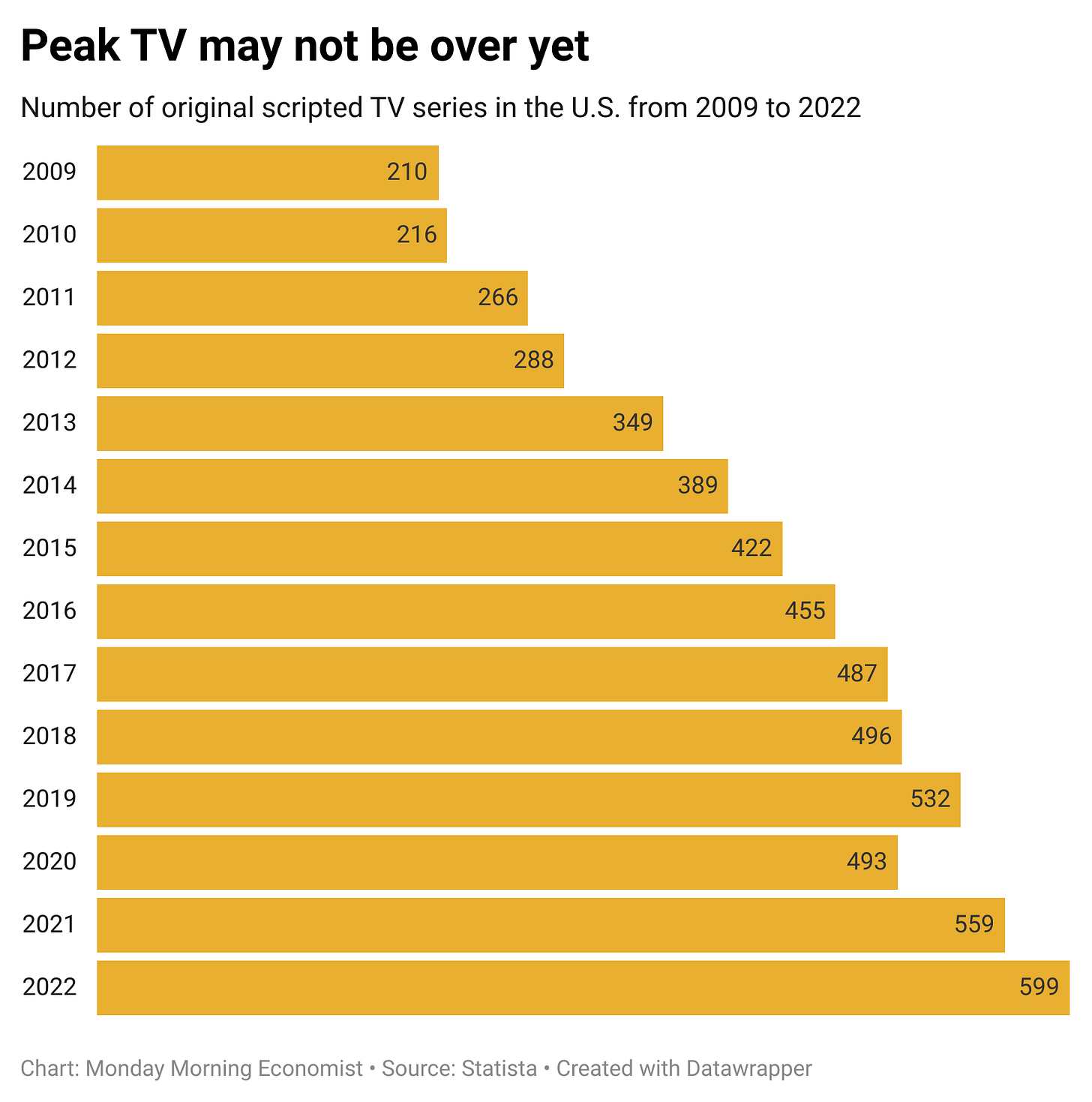Are You Still Watching the WGA Strike?
The WGA strike is a powerful reminder of that creative destruction is a natural component of progress
As the entertainment landscape evolves, the Writers Guild of America (WGA) finds itself in the middle of an ongoing labor dispute that is centered on a significant shift in the entertainment industry. The WGA has been on strike since May 2, seeking increased funding and job security for writers and limited use of artificial intelligence in the writing process. It has also been a stark reminder of the power of creative destruction.
The WGA strike will have a direct impact on viewers. Late-night shows will likely be the first group affected, and then various programming across platforms like network and streaming shows, movies, and events like awards shows. While it’s easy for us to fall back on streaming platforms that seem to have a never-ending supply of our favorite shows, that behavior is part of the reason the WGA is on strike. The main area of contention is related to residuals from streaming media, but this all should serve as a stark reminder that creative destruction is an intrinsic part of a vibrant economy and no industry is immune.
Over the past decade, the rapid growth of streaming services has transformed the way we consume content. Traditional media outlets have gradually given way to on-demand streaming, allowing viewers to access their favorite shows and movies anytime, anywhere. This revolution has provided unparalleled convenience for consumers but has also brought about a sizeable shift in the economics of the entertainment industry. Twenty years ago, writers earned a decent living writing for a network television show, especially if the show made its way into syndication. Today, the final product has changed enough that it’s harder to make a career out of writing.
Creative destruction is a term coined by economist Joseph Schumpeter, referring to the process through which new innovations and technologies disrupt existing industries and methods. It involves the dismantling of traditional structures and the subsequent birth of new ones. The concept appears disruptive, but it’s an essential component of progress and entrepreneurship.
The evolution of streaming has resulted in a much broader variety of entertainment options that wouldn’t have likely found a spot on network television in years past. All of the different platforms are competing for innovative and diverse stories, which offer an opportunity for marginalized communities that were previously disregarded by traditional outlets.
As with many other technological shifts, there are winners and losers. The old entertainment model relied heavily on advertising revenue and DVD sales, which generated significant residuals for writers. As more shows make their way onto streaming platforms, those revenue sources are no longer as important and syndication becomes less important than before. The WGA argues that this change has had a direct impact on their average incomes, leading to the current labor dispute.
While it is important to address the concerns of the WGA, it is equally important to recognize that creative destruction is an unstoppable force driven by evolving consumer preferences. The emphasis on streaming over the past decade reflects that evolution in the entertainment industry. As a society, we value convenience, personalization, and access to a vast library of content. Consumers have embraced this change wholeheartedly, but the writers are finding the new landscape challenging.
The challenge lies in finding a balance that ensures fair compensation for writers while acknowledging the creative destruction that is reshaping the industry. Negotiations between the WGA and the Alliance of Motion Picture and Television Producers (AMPTP) must strike a balance that recognizes the value of writers' contributions but continues to support the growth of the streaming platforms.
As the strike marches on, our favorite shows may soon be impacted if they haven’t already. It is important to remember that creative destruction is not unique to the entertainment industry. It is an ever-present force that affects various sectors, from manufacturing to technology, and shapes the trajectory of our society. Even if we believe we are working in an innovative industry, we must remember our sector may be next. Rather than fearing or resisting change, it is crucial to adapt and embrace it.
Approximately 32% of U.S. adults prefer streaming services for movie premiers compared to movie theatres [Morning Consult]
Two-thirds of entertainment industry leaders believe its at least somewhat likely that writers will achieve their goals by striking [Variety]
Audiences spent an average of 190.9 billion minutes streaming content per week last summer [NPR]
74% of people say they use at least one streaming service [NPR]






